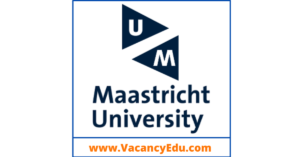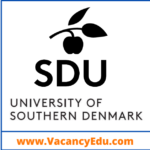Maastricht University, Netherlands invites online Application for number of Fully Funded PhD Degree at various Departments. We are providing a list of Fully Funded PhD Programs available at Maastricht University, Netherlands.
Eligible candidate may Apply as soon as possible.
(01) PhD Degree – Fully Funded
PhD position summary/title: PhD position Department of Food Innovation and Health, Bioavailability of plant-based micronutrients
We are looking for a highly motivated, creative candidate with a strong background in Biomedical Sciences or (Medical) Biotechnology or a related field. This is a challenging, multi-disciplinary, collaborative project that will be performed at multiple locations (primarily in Venlo and in part in Maastricht, both at Maastricht University in the Netherlands). We encourage applicants who have a passion for nutrition and life style interventions and have sufficient planning and organizational skills to apply.
Deadline : 06.11.2024
(02) PhD Degree – Fully Funded
PhD position summary/title: PhD candidate: top-down covalent adaptable and circular epoxy networks
The European Green Deal is driving a shift towards a circular economy by 2050, challenging polymer science to revolutionize thermoset recycling. This project pioneers a completely new approach to make widely available epoxy-amine networks (e.g. wind mill blades) recyclable, while they are normally not recyclable. The key is a transformation of a bond present in the network to another bond with so-called reversible behavior upon a trigger (e.g. temperature), what makes recycling possible. This breakthrough in epoxy-amine recycling will be validated on coatings and composites.
The PhD student will be appointed at the Aachen-Maastricht Institute for Biobased Materials of Maastricht University, which is part of the Faculty of Science and Engineering. The part on model studies will be supervised by dr. Jordy Saya and Prof. Romano Orru from the Biobased Organic Chemistry group. For the polymer part of the project, you will work in the Sustainable Polymer Synthesis group of Associate Professor Katrien Bernaerts, which focusses on the synthesis and design of polymer materials with tunable properties and recyclability exploiting the functionality of biobased building blocks. You will operate from the Brightlands-Chemelot Campus in Geleen (Nl), where the labs are located.
Deadline : 31.12.2024
View All Fully Funded PhD Positions Click Here
(03) PhD Degree – Fully Funded
PhD position summary/title: PhD Candidate | Department of Circular Chemical Engineering | Circular Plastics team
Join our cutting-edge project focused on advancing the future of flame retardant (FR) plastics! We are seeking a motivated PhD candidate to explore the degradation, processing, and recycling of polypropylene (PP) combined with innovative phosphorus-sulfur flame retardants. Despite their promising performance at low concentrations, P-S FRs are not yet commercially viable due to unknown decomposition mechanisms that hinder recyclability. This interdisciplinary research aims to unravel these mechanisms and establish a scientific foundation for developing new PP/FR materials with improved recyclability, ultimately contributing to sustainable practices in electronics and transportation industries.
In the SuFiP-S project, we have built a focused consortium composed of academia and industry to tackle these challenges. The PhD will thus be working in close collaboration with leading experts in the field to create state-of-the-art insights with immediate technological impact.
Deadline : 31.03.2025
(04) PhD Degree – Fully Funded
PhD position summary/title: PhD Candidate on LLMs and Marketing Insights
The PhD project leverages Language Models (LLMs) and social media data to conduct trend analysis, sentiment analysis, and integrate insights into executive data-driven decision-making models and dashboards in near real-time. It aims to explore consumer trends in the specified focus area using this integrated approach, utilizing the consumer’s voice as an early warning system. The project seeks to establish a swift data flow for R&D, quality, and other teams to implement actionable measures.
Deadline : 31.10.2024
(05) PhD Degree – Fully Funded
PhD position summary/title: PhD in the history of biological fieldwork and gender
The History Department is looking for a PhD candidate to conduct research into the gender dimensions of biological fieldwork in the second half of the 20th century (starting date 01-01-2025). The focus will be on networks between women doing biological fieldwork. The position will consist of 85% research and 15% teaching.
The candidate will combine approaches from the history of science, Science and Technology Studies (STS), gender studies and postcolonial history to study the formal and informal relationships between women biologists working in different field sites. In the second half of the 20th century, Asian and African national parks experienced a gradual, yet unprecedented inflow of women researchers with their own credentials. Besides a handful well-known primatologists, this generation of women researchers, their networks, and their contributions to research and conservation projects and practices in remote and often colonized or formerly colonized landscapes, remains under-researched in the history of science. Yet, studying these networks can give important insights into mechanisms of inclusion and exclusion in the making of environmental knowledge and its local embeddedness. The PhD candidate will document and analyze the networks of women biologists who entered the field during the 1960s, 1970s, and 1980s. The candidate will investigate 1) how both research practices and research topics in biology changed in the second half of the twentieth century with women researchers studying animals other than primates entering the field; and 2) how, in the case of women field researchers, gender intersected with the politics of research and environmental protection in colonized and formerly colonized regions.
The PhD candidate will work closely with the members of the supervisory team, consisting of Simone Schleper, Brigitte le Normand, and Raf De Bont. The candidate’s role will include making connections across their own project and the research fields represented in the supervisory team, such as the history of environmental governance, gender and labor history, and the history of field biology in the 19th and 20th century. The PhD candidate will take active part in the activities of the interdisciplinary Globalization, Transnationalism and Development (GTD) research group. The project’s theme additionally connects with work done in the Maastricht University Science, Technology and Society Studies (MUSTS) research group and FASoS’s Center for Gender and Diversity.
Deadline : 31.10.2024
Polite Follow-Up Email to Professor : When and How You should Write
Click here to know “How to write a Postdoc Job Application or Email”
(06) PhD Degree – Fully Funded
PhD position summary/title: PhD candidate: synthesis and evaluation of biobased covalent adaptable networks (project SusInkCoat)
This project is part of the SusInkCoat consortium with partners both the public and the private sector. The goal of the SusInkCoat project is to develop switchable and adaptive functional polymers and additives for low environmental footprint.
Plastics have their drawbacks: their production consumes energy and leads to greenhouse gas emissions; they are made from non-sustainable materials; they do not decompose; and less than 10% are recycled. Much progress has been made in making plastics more sustainable for larger applications. However, thin films, such as those used in coatings and inks, are lagging behind. The SusInkCoat project is changing that. Researchers are developing new materials, processes and applications to improve the durability, functionality and recyclability of coatings, thin films and inks. In addition, the consortium is training a new generation of chemical developers for whom sustainability and circularity are core values.
The task of Maastricht University is to develop biobased monomers and recyclable thermosets thereof, as well as the chemical and physical polymer characterization. Recyclability of the thermosets will be obtained by the introduction of dynamic bonds and their dynamic behavior will be studied. Properties of the resulting inks and coatings will also be investigated. The PhD student will work closely together with academic and industrial project partners in the consortium. Samples will be upscaled for the testing by the industrial partners. Based on their feedback, the synthesis work will be tuned.
The PhD student will be appointed at the Aachen-Maastricht Institute for Biobased Materials of Maastricht University, which is part of the Faculty of Science and Engineering. You will work in the Sustainable Polymer Synthesis group of Associate Professor Katrien Bernaerts, which focusses on the synthesis and design of polymer materials with tunable properties and recyclability exploiting the functionality of biobased building blocks. You will operate from the Brightlands-Chemelot Campus in Geleen (Nl), where the labs are located.
Deadline : 30.12.2024
(07) PhD Degree – Fully Funded
PhD position summary/title: PhD candidate synthesis & evaluation of biobased, responsive and self-dispersible waterborne resins.
This project is part of the SusInkCoat consortium with partners both the public and the private sector. The goal of the SusInkCoat project is to develop switchable and adaptive functional polymers and additives for low environmental footprint.
Plastics have their drawbacks: their production consumes energy and leads to greenhouse gas emissions; they are made from non-sustainable materials; they do not decompose; and less than 10% are recycled. Much progress has been made in making plastics more sustainable for larger applications. However, thin films, such as those used in coatings and inks, are lagging behind. The SusInkCoat project is changing that. Researchers are developing new materials, processes and applications to improve the durability, functionality and recyclability of coatings, thin films and inks. In addition, the consortium is training a new generation of chemical developers for whom sustainability and circularity are core values.
The task of Maastricht University is to develop biobased monomers and stimuli-responsive latex resins thereof via emulsion polymerization, as well as the chemical and physical polymer characterization. The resins are designed to be crosslinkable via reversible bonds and the recyclability of the thermosets will be studied. Properties of the resulting inks and coatings will also be investigated. The PhD student will work closely together with academic and industrial project partners in the consortium. Samples will be upscaled for the testing by the industrial partners. Based on their feedback, the synthesis work will be tuned.
The PhD student will be appointed at the Aachen-Maastricht Institute for Biobased Materials of Maastricht University, which is part of the Faculty of Science and Engineering. You will work in the Sustainable Polymer Synthesis group of Associate Professor Katrien Bernaerts, which focusses on the synthesis and design of polymer materials with tunable properties and recyclability exploiting the functionality of biobased building blocks. You will operate from the Brightlands-Chemelot Campus in Geleen (Nl), where the labs are located.
Deadline : 30.12.2024
About Maastricht University, Netherlands –Official Website
Maastricht University is a public university in Maastricht, Netherlands. Founded in 1976, it is the second youngest of the thirteen Dutch universities.
In 2019, 19,000 students studied at Maastricht University, 54% of whom were foreign students, with over 4,000 employees. About half of the bachelor’s programmes are fully offered in English, while the other half is taught wholly or partly in Dutch. Most of the master’s and doctoral programmes are in English. Besides traditional programmes, Maastricht University also has an honours liberal arts college: University College Maastricht and a Maastricht Science Programme in the same liberal arts tradition. The satellite University College Venlo opened in 2015.
Disclaimer: We try to ensure that the information we post on VacancyEdu.com is accurate. However, despite our best efforts, some of the content may contain errors. You can trust us, but please conduct your own checks too.
Related Posts
- PhD Degree (34)-Fully Funded at Loughborough University, Leicestershire, England

- PhD Degree (15)-Fully Funded at University of Southern Denmark, Denmark

- PhD Degree (24)-Fully Funded at Forschungszentrum Julich, Germany

- PhD Degree (08)-Fully Funded at Vrije University Amsterdam, Netherlands

- PhD Degree (27)-Fully Funded at Nottingham Trent University (NTU), England

- PhD Degree (24)-Fully Funded at University of Oslo, Norway

- PhD Degree (04)-Fully Funded at Masaryk University, Czech Republic

- PhD Degree (29)-Fully Funded at University of Oslo, Norway

- PhD Degree (13)-Fully Funded at University of Stavanger, Norway










